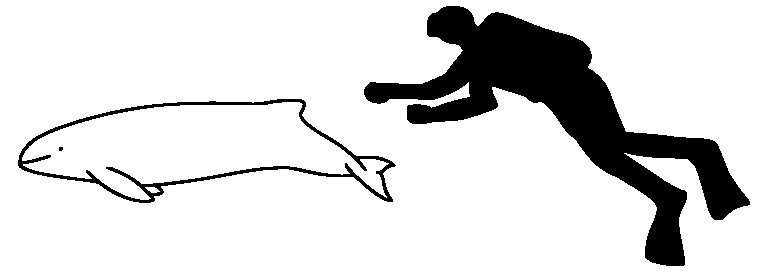Burmeister's Porpoise
From Wikipedia, the free encyclopedia
[Photo] Size comparison of an average human and a Burmeister's porpoise. Date 27 May 2007. Author Chris_huh http://commons.wikimedia.org/wiki/User:Chris_huh
Burmeister's Porpoise (Phocoena spinipinnis) is a species of porpoise endemic to the coast of South America. It was first described by Hermann Burmeister, for whom the species is named, in 1865.
Population and distribution
Whilst Burmeister's Porpoise seems to be relatively common in its range, little work has been done to survey the species. Its range appears to be continuous in coastal waters from northern Peru in the Pacific round Tierra del Fuego and up to southern Brazil in the Atlantic. The total population is at least in the tens of thousands. Whilst usually described as staying very close to the shore, individuals have been spotted as far as 50 km from the shore and in the freshwater Valivia River in southern Chile.
Physical description
Most photographs of Burmeister's Porpoises are taken of dead specimens and show the animal to be coloured black. This phenomenon gave rise to the earlier common name, the Black Porpoise. However live individuals are typically a dark grey colour. They turn black in just a few minutes after death. The underside varies in colour but is usually a lighter grey. Burmeister's are about 150 cm long when fully mature and weigh 50???75 kg. The maximum recorded weight is that of a female at 105 kg. They have a shallow indentation at their blowhole set just in front of the eyes. The shape and placement of the dorsal fin is unusual for a cetacean???it is triangular rather than curved and points backwards more than upwards. It is located about three quarters of the way along the back???further back than any other dolphin or porpoise. These features are sufficient to distinguish the porpoise from the similar-sized Chilean Dolphin which is found in the porpoise's Pacific range.
Behaviour
Burmeister's Porpoise is difficult to observe. It appears to be shy, shows little of its body when surfacing and will move quickly away from approaching boats. They are typically seen alone or in pairs with occasional larger groups. One report from Chile saw a group of 70 in number. The porpoise feeds on various pelagic fish such as anchovies, hake and mackerel.
Conservation
Like all porpoises, Burmeister's is vulnerable to accidental capture in fishing nets. This is common in Uruguay, Peru and Chile. The annual estimated catch is largest in Peru, at 2000 individuals [5]. Burmeister's are also harpooned deliberately for food and for use as shark bait.
In severe El Nino events, the ecosystem of the Humboldt current is disrupted. Anchovies either perish or leave the area, and it appears that many porpoises and other marine mammals starve as a result.[6]
The IUCN lists the animal as data deficient in its Red List of Threatened Species. The long-term prognosis for the species is unknown.
http://en.wikipedia.org/wiki/Burmeister%27s_Porpoise
| The text in this page is based on the copyrighted Wikipedia article shown in above URL. It is used under the GNU Free Documentation License. You may redistribute it, verbatim or modified, providing that you comply with the terms of the GFDL. |
|

